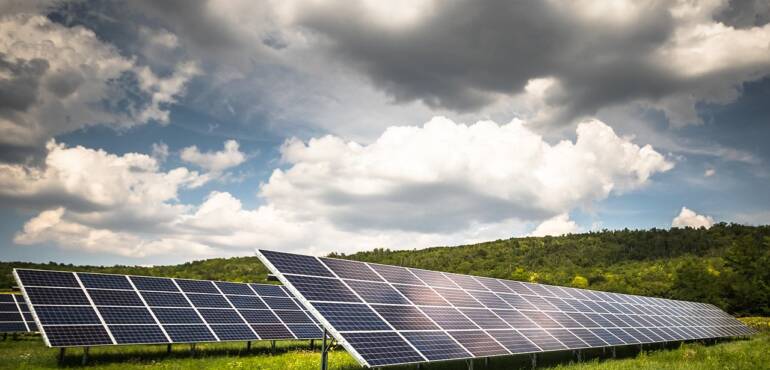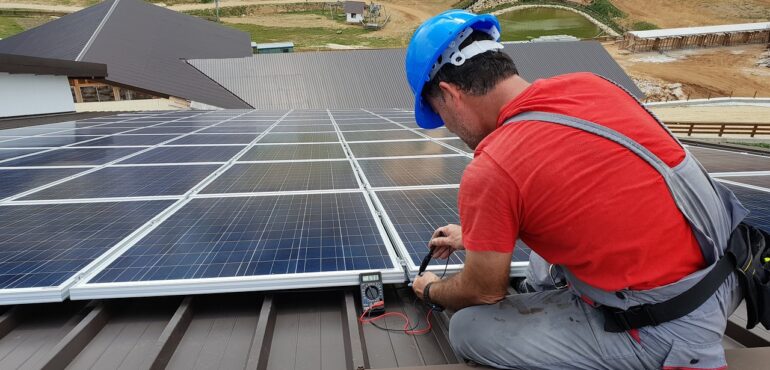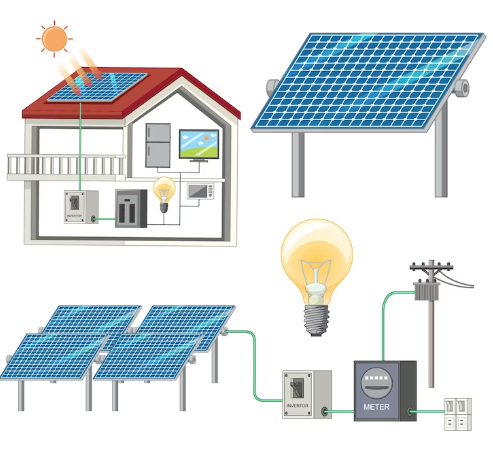Do Solar Panel Work on Winter Days?
Winter is undoubtedly a challenging time for solar power systems, but rest assured, solar energy systems do work during this season. By taking appropriate precautions and considerations, it is possible to guarantee optimal performance of your solar energy system, even when faced with extreme winter conditions. It’s natural to have questions and doubts about whether solar panels are suitable for your home, especially when considering their performance during winter or on cloudy days. However, the good news is that solar panels can indeed operate and generate energy even when the weather is less than ideal.
Solar panels rely on harnessing the sun’s energy, but their functionality is not limited to sunny afternoons or long summer days. They can tap into the sun’s power throughout the year, including on cloudy mornings and during the shorter winter days. While the overall energy production may be slightly lower compared to sunnier seasons, solar panels can still capture and convert sunlight into usable electricity, even when the sun’s rays are less intense or obscured by clouds.
Gaining Insight into Solar Panels
Solar panels are comprised of solar photovoltaic (PV) cells, which contain semiconductor materials such as silicon. These solar cells are specifically designed to generate electricity from daylight, rather than relying solely on sunlight or heat. When light interacts with the PV cells, it triggers the movement of electrons, thus generating electricity. Consequently, solar PV panels have the capability to produce power during daylight hours, while remaining inactive at night (although this limitation can be overcome by integrating a battery storage system).
The amount of electricity generated by solar panels is primarily influenced by the intensity of sunlight. Typically, the panels receive the most sunlight around noon when the sun is at its highest point in the sky, particularly on clear and sunny days when the light is most intense. However, even on gloomy winter afternoons with diminished light conditions, solar panels can still capture enough energy to generate electricity. This implies that solar panels can effectively produce power even when sunlight is not at its peak or during overcast weather conditions.
By harnessing solar PV technology, you can capitalize on available daylight to generate clean and renewable electricity. Whether it’s a sun-drenched day or a cloudy winter afternoon, solar panels remain a reliable solution for harnessing the sun’s energy and diminishing dependence on conventional power sources.
Solar System Performance in Winter

In winter, the duration of daylight decreases, which limits the electricity generation capacity of solar panels. Moreover, sunlight hits the panels at a lower angle during this season, leading to a further decline in available sunlight. It is common for electricity demand to peak during winter. Therefore, this period presents a significant challenge for your solar power system, revealing whether you accurately sized your system.
Tips for Making Sure that Your PV System Lasts a Demanding Winter
When it comes to ensuring the longevity of your photovoltaic (PV) system during harsh winter conditions, there are several precautions and tips you can follow. Winter poses challenges like snow, ice, and reduced sunlight, but with proper care, your PV system can continue operating optimally. Here are some guidelines to help you maintain your PV system during the winter months.
During winter, optimizing the performance of your solar panels is crucial. Consider the following factors to ensure your solar system operates at its best:
- Adjust the tilt angle: Modify the tilt angle of your solar array to align with the winter angle. This adjustment allows for optimal sunlight capture, compensating for the sun’s lower position in the sky during winter.
- Efficient energy usage: Use only necessary loads and avoid unnecessary lighting. Turn off excessive lights when not in use to conserve energy. Additionally, identify and disconnect ghost loads—devices that consume power even when switched off and plugged in.
- Energy-efficient lighting: Replace high-wattage bulbs with energy-efficient alternatives. For instance, by switching from a 60-watt incandescent bulb to a 15-watt energy-efficient CFL, you can save approximately 75% of energy without compromising light output.
- Battery temperature monitoring: Pay close attention to the temperature of your solar system’s batteries. Ensure they never go below freezing point, as extremely low temperatures can damage battery performance and longevity.
- Voltage level monitoring: Regularly monitor the voltage levels of each cell in lead acid batteries. Most solar battery failures occur gradually over time rather than suddenly. By regularly checking voltage levels, you can identify and address potential issues before they escalate, ensuring the longevity and efficiency of your battery storage system.

- Proper house insulation: Maintain proper insulation in your home to conserve heat during the winter months. Well-insulated homes require less heating, reducing overall energy consumption and optimizing the performance of your solar system.
- Smart heating system: Utilize a heating system equipped with a digital thermostat to automatically maintain a preset temperature. This ensures efficient energy usage by avoiding unnecessary heating and reducing heat loss.
- Backup generator readiness: If a consistent power supply is crucial for your needs, ensure you have a backup generator readily available. Test its functionality in advance and keep an adequate fuel supply on hand.
By considering these factors and implementing the necessary measures, you can optimize the performance of your solar system during winter. Efficient energy usage, battery monitoring, insulation, and backup solutions all contribute to maximizing the benefits of your solar panels throughout the colder months. Embrace the potential of solar energy and its resilience even in challenging winter conditions. Also, ensure that you call a professional solar installer for the process.
The Responsibilities of Owning a PV System
Owning a PV system entails responsibilities, especially during severe winter months. It requires wise maintenance and smart practices to maximize electricity generation while being mindful of consumption. Remember, you are now your own power company, and proper planning and maintenance are vital responsibilities. By taking proactive measures, such as optimizing energy generation and being mindful of efficient consumption, you can ensure the smooth operation of your solar system. Embrace the role of a responsible energy steward, and with careful planning and maintenance, enjoy the benefits of renewable energy throughout the year.
Conclusion
In conclusion, solar panels can generate electricity even during winter days, although their energy production may be slightly lower than in sunnier seasons. They are designed to capture and convert daylight into usable energy, making them effective even on cloudy or shorter winter days. To ensure optimal performance, adjust the tilt angle of the solar array, monitor solar battery temperature and voltage levels, optimize energy usage, and maintain proper insulation and heating systems. Having a backup generator and fuel supply adds further reliability. By being proactive in maintenance and mindful of consumption, you can maximize the benefits of solar energy and contribute to a sustainable future.
FAQs
Solar panels with monocrystalline cells are best for cold weather conditions as they have high efficiency and perform well in low temperatures due to their low-temperature coefficient.
In general, solar panels may need more frequent cleaning in winter due to factors like snow, ice, and dirt buildup. However, the specific cleaning frequency will depend on the location, weather conditions, and tilt angle of the panels.
The installation time for a solar energy system in winter can vary depending on various factors, including the system size, complexity, and weather conditions. On average, it may take a few days to a couple of weeks to complete the installation process.
Yes, solar panels generally produce less energy in winter compared to summer due to factors such as shorter days, lower sunlight intensity, and potential snow or ice coverage. However, the decrease in energy production can vary depending on geographical location and weather patterns.
When installing solar panels in winter, a few considerations include ensuring proper roof conditions, clearing any snow or ice accumulation, and accounting for the lower angle of the sun. It’s also important to work with a professional installer experienced in cold-weather installations.

Ileen Kaur (Author)
Ileen Kaur is an exceptional content writer, bringing her expertise and creativity to the digital realm. With a passion for storytelling and a knack for crafting compelling narratives, she has the power to captivate audiences and leave a lasting impression.


